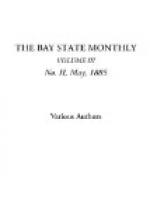Andrew rose slowly at the bar. To his clients he simply did his duty, and that was all. He was not a learned lawyer, nor was he in any sense a great lawyer, and yet he expended great care and industry in looking up his cases, and probably never lost a client who had once employed him. We are told by one of his biographers that, “during all these years he was not what was called a student, but was never idle.” He entered largely into the moral questions of that day; was greatly interested in the preaching of James Freeman Clarke; a constant attendant at meeting and the Bible-classes. Occasional lay-preaching being the custom of that church, young Andrew sometimes occupied the pulpit and conducted the services to the general acceptance of the people.
Andrew did not become actively interested in politics until his admission to the bar, and then he joined the Whig party, and became thoroughly in earnest in advocating the Anti-Slavery movement. In 1859 he was chosen to the lower branch of the Legislature and at once took a prominent position. In 1860 he was nominated for Governor of the Commonwealth, by a general popular impulse which overwhelmed the old political managers, who regarded him as an intruder upon the arena, and had laid other plans. He was called to the position of chief magistrate of Massachusetts at a most momentous time, but he was found equal to the emergency, and early acquired, by general consent, the title of “The Great War-Governor.”
It was just on the eve of the Rebellion, and the whole North was excited by the events which had already transpired. In his inaugural address in January, ’61, Governor Andrew advised that a portion of the militia should be placed on a footing of activity, in order that, “in the possible contingencies of the future the State might be ready without inconvenient delay to contribute her share of force in any exigency of public danger,” and immediately despatched a confidential messenger to the Governors of Maine and New Hampshire to inform them of his determination to prepare for instant service the militia of Massachusetts, and to invite their cooeperation.
This is not the place nor the time to give even a resume of Governor Andrew’s administration. He retired from office at the close of 1865, after a service of unexampled interest and importance in the history of the Commonwealth. He retired with honor to himself and to the regret of all who had known him best. We have already alluded to Governor Andrew’s interest in the question of Anti-Slavery, and it should be stated that in regard to the emancipation of the slaves he was among the first, as he was the most persistent advocate of a measure which he considered the greatest blow that could be struck at the enemy, fully justified as a measure of war and demanded by every consideration of justice and humanity.
Apropos of his impatience on this subject the following incident related by one of the Governor’s friends is worth recalling:—




